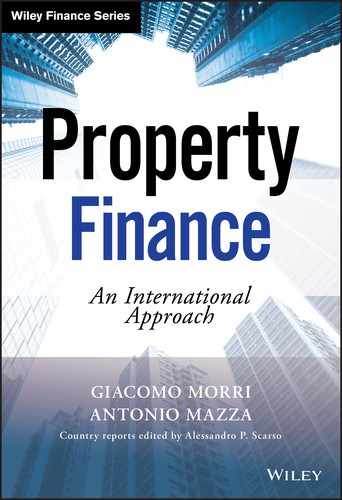Preface to Part Two
The core skills required in the field of property finance – taken in its broad sense to include both the financing and marketing of real estate as well as the securitization of real estate and rental income receivables – are common to all professional operators, irrespective of where a real estate loan is applied for or granted.
The authors of this study have taken this fact as their starting point: from the identification of the borrower to the various stages of due diligence for structured financing; from the specific loan drawdown arrangements to repayment plans; from issues relating to loan syndication to forms of “direct” participation by the lender in the business risk associated with the loan through hybrid financing. In this context, it is instructive that the largest specialist operators often have a significant local presence, as part of their constant and on-going quest for the ideal mix between financial return and risk, which is evidently dependent upon the optimization of investment portfolios and the individual propensity for risk.
Leaving aside for one moment the fact that, from a strictly technical point of view, core skills are identical, it is clear that the formalities associated with structured financing cannot occur in isolation from the legal framework. The relevance of the statutory framework is not strictly limited to the regulation of the contractual instrument of choice. It is indeed indispensable that a close examination of the various ramifications of the legal position, considered overall, be carried out: from issues falling under civil law lato sensu (including the enforceability of guarantees, along with the liability of the guarantor in cases involving the issue of a comfort letter) to various questions under corporate law (including the frequent instances of loans granted to Special Purpose Vehicles [SPVs] within a group context, which are hence subject to inter-group financing arrangements, de facto administration, and prospective liability on the part of the controlling entity); from tax law (needless to say, tax implications cannot be left out of the definition of structured financing) to procedural issues under civil law and the law on bankruptcy, both from the perspective of non-performing loans (a scenario which evidently cannot be neglected within an overall assessment of real estate financing) and with reference to the access to voluntary schemes of arrangement by a borrower or to insolvency proceedings.
From the inter-disciplinary perspective set out above, and in keeping with the supranational dimension chosen, the authors have paired up the “technical” part, which seeks to illustrate core skills relating to real estate financing, with a part summarizing legislative aspects in selected jurisdictions, drawing on the contributions of renowned property finance experts from the individual legal systems considered.
It goes without saying that – due to obvious requirements of brevity, as dictated by the mandate of the study – it would not have been possible to provide an exhaustive illustration of the various complex legal aspects associated with real estate financing operations: also for that reason, an “operational” approach has been preferred which, rather than providing pointless technical explanations, provides operators with an immediate outline of the most significant aspects of the specific regulations applicable to property financing within each legal system considered.
Against this backdrop, irrespective of the structural differences between land law in civilian and common law legal systems, operators will find a straightforward explanation as to why, for example, the instrument of the Grundschuld is preferred in Germany over the traditional mortgage as the principal instrument used for real estate lending. An explanation will be provided for the failure to use letters of responsibility or the reticence in requesting comfort letters in the People's Republic of China, even where the borrower is a SPV controlled by an industrial group. The study will also suggest why Italian lenders tend to shrink from initiatives that encroach further on the management of borrowers in distress (even though – at least as a matter of principle – Italian lenders have voting rights in the borrower's shareholder meeting).
The extension of the scope of the study to legal issues undoubtedly also reflects the broad professional experience built up by the authors in the real estate financing sector. This reflects their awareness that decisions specifically relating to real estate financing cannot fail to adopt an inter-disciplinary perspective. The analysis is complemented by the skilful pairing up of illustrations of fundamental theoretical issues from property finance with their “operational” implications, as is eloquently demonstrated by the examples illustrating individual structured financing operations.
Publication of the study by Giacomo Morri and Antonio Mazza comes in the wake of the end – in Europe as well as the USA – of the long recession sparked off by the US sub-prime mortgage collapse.
As is known, the economic and financial crisis – the most serious peacetime crisis since the Great Depression – was caused to a significant extent by the progressive distancing of increasingly sophisticated real estate financing operations from the theoretical fundamentals of text-book finance.
Against this background, a real estate financing study that strikes a happy medium between theoretical aspects of property financing and the practical implications of instruments underlying real estate financing (and hence of the instruments enabling risk to be measured and allocated correctly) undoubtedly aims to achieve a greater awareness on the part of property finance operators – hailing predominantly from the private sector – of their individual responsibilities. Indeed, an acknowledgement of the central role played by the private sector and of its own responsibilities was, perhaps not by chance, very recently recognized by US President, Barack Obama, as a “rock-solid foundation to make sure the kind of crisis we just went through never happens again”.1
Milan – Frankfurt, August 2014
Alessandro P. Scarso
